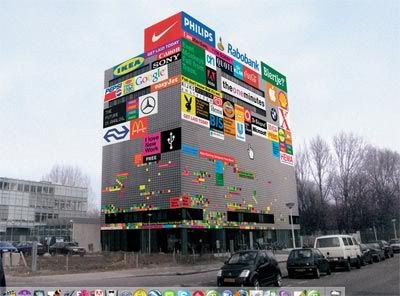quote: "Every self-considered art or design intellectual ends up twisting his or her nose to to the so-called "commercial" world. Art, culture, criticism is what matters. But we don't think so. We believe that now, more than always, the world is ruled by commercial and economical relationships. Culture defines, and most important, is deined these days by market dynamics."
There's a point... But how much can people take of this, maybe its unique for all of 30 mins, enough to capture some passing interest and be sellable for a while, but if you have 10, 15 of these, the value gets inflated and loses its novelty pretty quick... And how long before the public space gets spammed enough that it makes passerbyers want to barf and has a negative value for their corporations?
How does this actually benefit public space? Seems more of a parasite than a symbiotic relationship.
public space isn't about traffic, its about ownership by people, isn't it? or are is this implying that these days people are now more about what they buy than what they do?
a tapestry of signs? maybe each individual sign is meaningless, or is it the aggregate of these many graphic signs that creates the urban fabric? each sign disappears but merges into a collective aura of the city?
signs that are lighting too...? where the private spaces behind the walls of light in the night of the city become darker, more intimate, overcome overwhelmed by the colors and intense illumination of the street...
in this case, the signs do something... actually they construct space change the significance of the darker interiors behind them
on the other hand... is there a difference between an individual custom graphic design, and advertisement billboarding? uniqueness vs. bland repetition? a custom sign vs. mass spam of disposable images? Does craft in graphic communication matter?
the other thing about tokyo is.. the signage emerges through a kindof pure lack of regulation... that is quite different than a company mapping square footage of rental bilboard space on a building facade...
tokyo is like organic city vs. this company's idea which is like big brother watching you, controlled farming of your viewing space to feed the matrix
Banner building
Why bother designing nice facades when you can sell them and make money?

http://www.sandberg.nl:16080/artvertising/
yes... thanks for the visual pollution buddy.
i like how playboy, xerox and mcdonalds all share the same target demographic
quote: "Every self-considered art or design intellectual ends up twisting his or her nose to to the so-called "commercial" world. Art, culture, criticism is what matters. But we don't think so. We believe that now, more than always, the world is ruled by commercial and economical relationships. Culture defines, and most important, is deined these days by market dynamics."
There's a point... But how much can people take of this, maybe its unique for all of 30 mins, enough to capture some passing interest and be sellable for a while, but if you have 10, 15 of these, the value gets inflated and loses its novelty pretty quick... And how long before the public space gets spammed enough that it makes passerbyers want to barf and has a negative value for their corporations?
How does this actually benefit public space? Seems more of a parasite than a symbiotic relationship.
public space isn't about traffic, its about ownership by people, isn't it? or are is this implying that these days people are now more about what they buy than what they do?
hmm.. reminds me a lot of www.milliondollarhomepage.com
what's wrong with a bit of signage?

its funny how when there are so many signs each individual sign becomes useless.
the tokyo case
a tapestry of signs? maybe each individual sign is meaningless, or is it the aggregate of these many graphic signs that creates the urban fabric? each sign disappears but merges into a collective aura of the city?
signs that are lighting too...? where the private spaces behind the walls of light in the night of the city become darker, more intimate, overcome overwhelmed by the colors and intense illumination of the street...
in this case, the signs do something... actually they construct space change the significance of the darker interiors behind them
on the other hand... is there a difference between an individual custom graphic design, and advertisement billboarding? uniqueness vs. bland repetition? a custom sign vs. mass spam of disposable images? Does craft in graphic communication matter?
or is chaos charm?
the other thing about tokyo is.. the signage emerges through a kindof pure lack of regulation... that is quite different than a company mapping square footage of rental bilboard space on a building facade...
tokyo is like organic city vs. this company's idea which is like big brother watching you, controlled farming of your viewing space to feed the matrix
would we change our perception if we understood the signs in tokyo?
Block this user
Are you sure you want to block this user and hide all related comments throughout the site?
Archinect
This is your first comment on Archinect. Your comment will be visible once approved.